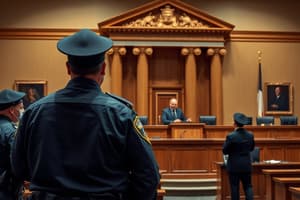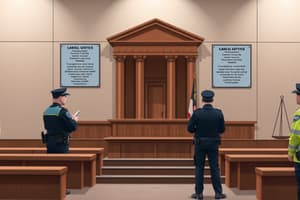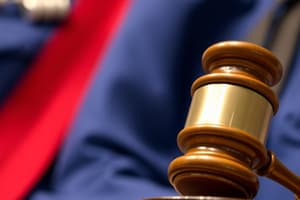Podcast
Questions and Answers
What fundamental right must suspects be informed of before custodial interrogation?
What fundamental right must suspects be informed of before custodial interrogation?
- Right to public defense
- Right to a jury trial
- Right to remain silent (correct)
- Right to appeal
What does actus reus refer to in criminal law?
What does actus reus refer to in criminal law?
- Legal representation
- Guilty act or conduct (correct)
- Circumstantial evidence
- Intent to commit a crime
What is the primary focus of specific deterrence?
What is the primary focus of specific deterrence?
- Discouraging individual offenders (correct)
- Imposing heavier penalties for serious crimes
- Preventing future crimes in general
- Rehabilitating juvenile delinquents
What landmark case established the requirement for informing suspects of their rights?
What landmark case established the requirement for informing suspects of their rights?
What does judicial review allow courts to do?
What does judicial review allow courts to do?
What was a key feature of the Pennsylvania prison system?
What was a key feature of the Pennsylvania prison system?
What Supreme Court case highlighted the issue of medical care for prisoners?
What Supreme Court case highlighted the issue of medical care for prisoners?
What is one potential consequence of general deterrence in the criminal justice system?
What is one potential consequence of general deterrence in the criminal justice system?
What are the three traditional components of the criminal justice system?
What are the three traditional components of the criminal justice system?
What is dual federalism?
What is dual federalism?
What is the primary difference between a misdemeanor and a felony?
What is the primary difference between a misdemeanor and a felony?
How do the police act as 'gatekeepers' in the criminal justice system?
How do the police act as 'gatekeepers' in the criminal justice system?
What is the significance of Miranda v. Arizona (1966) for law enforcement?
What is the significance of Miranda v. Arizona (1966) for law enforcement?
What distinguishes general deterrence from specific deterrence in crime control?
What distinguishes general deterrence from specific deterrence in crime control?
What do the terms actus reus and mens rea refer to in the context of proving a crime?
What do the terms actus reus and mens rea refer to in the context of proving a crime?
What is meant by 'prisoner's rights'?
What is meant by 'prisoner's rights'?
What is the primary focus of restorative justice compared to traditional criminal justice practices?
What is the primary focus of restorative justice compared to traditional criminal justice practices?
Which theory of punishment seeks to prevent future crimes by discouraging offenders from reoffending?
Which theory of punishment seeks to prevent future crimes by discouraging offenders from reoffending?
What challenge arises when balancing individual rights with public safety in the context of terrorism?
What challenge arises when balancing individual rights with public safety in the context of terrorism?
Which of the following refers to the standard of proof required for a criminal conviction?
Which of the following refers to the standard of proof required for a criminal conviction?
Which Supreme Court role significantly influences criminal justice policy?
Which Supreme Court role significantly influences criminal justice policy?
What is a common ethical dilemma faced by law enforcement officers?
What is a common ethical dilemma faced by law enforcement officers?
What is the main purpose of community corrections?
What is the main purpose of community corrections?
What does 'Actus Reus' refer to in legal terms?
What does 'Actus Reus' refer to in legal terms?
What does the term 'mens rea' refer to in criminal law?
What does the term 'mens rea' refer to in criminal law?
Which of the following best defines 'double jeopardy'?
Which of the following best defines 'double jeopardy'?
What is the purpose of the grand jury in the criminal justice system?
What is the purpose of the grand jury in the criminal justice system?
What does 'incapacitation' aim to achieve within the context of punishment?
What does 'incapacitation' aim to achieve within the context of punishment?
In the context of defenses in criminal law, what does 'duress' imply?
In the context of defenses in criminal law, what does 'duress' imply?
Which of the following describes 'felony'?
Which of the following describes 'felony'?
What is 'deterrence' in the context of criminal justice?
What is 'deterrence' in the context of criminal justice?
What does 'judicial review' empower courts to do?
What does 'judicial review' empower courts to do?
What is the purpose of a plea bargain in the criminal justice system?
What is the purpose of a plea bargain in the criminal justice system?
Which of the following describes police brutality?
Which of the following describes police brutality?
What does the term 'probable cause' refer to in legal contexts?
What does the term 'probable cause' refer to in legal contexts?
What is defined as a status offense?
What is defined as a status offense?
What do sentencing guidelines specify?
What do sentencing guidelines specify?
What is the main aim of rehabilitation in the context of criminal justice?
What is the main aim of rehabilitation in the context of criminal justice?
What is a search warrant?
What is a search warrant?
What does retribution focus on in terms of punishment?
What does retribution focus on in terms of punishment?
Flashcards
Miranda Rights
Miranda Rights
The principle that suspects must be informed of their constitutional rights, including the right to remain silent and the right to legal counsel, before being interrogated while in police custody.
General Deterrence
General Deterrence
A type of deterrence that aims to prevent future crime by making examples of the offender punished.
Specific Deterrence
Specific Deterrence
A type of deterrence that aims to prevent future crime by an individual offender, based on their own experience of punishment.
Judicial Review
Judicial Review
Signup and view all the flashcards
Actus Reus
Actus Reus
Signup and view all the flashcards
Mens Rea
Mens Rea
Signup and view all the flashcards
Pennsylvania System
Pennsylvania System
Signup and view all the flashcards
Auburn System
Auburn System
Signup and view all the flashcards
What are the three main components of the criminal justice system and their roles?
What are the three main components of the criminal justice system and their roles?
Signup and view all the flashcards
What is dual federalism and how does it affect the criminal justice system?
What is dual federalism and how does it affect the criminal justice system?
Signup and view all the flashcards
What's the difference between a misdemeanor and a felony? Give examples.
What's the difference between a misdemeanor and a felony? Give examples.
Signup and view all the flashcards
Why are the police considered 'gatekeepers' in the criminal justice system?
Why are the police considered 'gatekeepers' in the criminal justice system?
Signup and view all the flashcards
What was the significance of Miranda v. Arizona (1966) for law enforcement?
What was the significance of Miranda v. Arizona (1966) for law enforcement?
Signup and view all the flashcards
What is the difference between general and specific deterrence?
What is the difference between general and specific deterrence?
Signup and view all the flashcards
Explain judicial review and its relevance to criminal justice.
Explain judicial review and its relevance to criminal justice.
Signup and view all the flashcards
What are actus reus and mens rea, and why are they crucial in criminal law?
What are actus reus and mens rea, and why are they crucial in criminal law?
Signup and view all the flashcards
Beyond a Reasonable Doubt
Beyond a Reasonable Doubt
Signup and view all the flashcards
Bail
Bail
Signup and view all the flashcards
Bench Warrant
Bench Warrant
Signup and view all the flashcards
Bifurcated Trial
Bifurcated Trial
Signup and view all the flashcards
Burden of Proof
Burden of Proof
Signup and view all the flashcards
Civil Law
Civil Law
Signup and view all the flashcards
Discretion
Discretion
Signup and view all the flashcards
Double Jeopardy
Double Jeopardy
Signup and view all the flashcards
Duress
Duress
Signup and view all the flashcards
Grand Jury
Grand Jury
Signup and view all the flashcards
Incapacitation
Incapacitation
Signup and view all the flashcards
Insanity Defense
Insanity Defense
Signup and view all the flashcards
Jurisdiction
Jurisdiction
Signup and view all the flashcards
Juvenile Justice System
Juvenile Justice System
Signup and view all the flashcards
Plea Bargain
Plea Bargain
Signup and view all the flashcards
Police Brutality
Police Brutality
Signup and view all the flashcards
Precedent
Precedent
Signup and view all the flashcards
Pretrial Detention
Pretrial Detention
Signup and view all the flashcards
Probable Cause
Probable Cause
Signup and view all the flashcards
Probation
Probation
Signup and view all the flashcards
Restitution
Restitution
Signup and view all the flashcards
Retribution
Retribution
Signup and view all the flashcards
Study Notes
Criminal Justice System Components
- Three traditional components: law enforcement, courts, and corrections
- Law enforcement investigates crimes, apprehends suspects, and maintains order
- Courts adjudicate cases, determine guilt/innocence, and impose sentences
- Corrections supervise and incarcerate convicted offenders, aiming for rehabilitation and reintegration into society
Dual Federalism
- Power divided between federal and state governments
- In criminal justice, both levels have their own laws, agencies, and courts
- Often results in overlapping jurisdictions and complexities
Misdemeanor vs. Felony
- Misdemeanor: Less serious crime, punishable by fines or jail time less than a year (e.g., petty theft, vandalism, public intoxication)
- Felony: More serious crime, punishable by imprisonment for a year or more (e.g., murder, robbery, arson)
Police as Gatekeepers
- Police initiate the formal criminal justice process
- Decide whether to ignore, warn, cite, or arrest suspected individuals
- Shape the flow of cases into the system
Miranda v. Arizona (1966)
- Landmark case requiring suspects to be informed of their constitutional rights, including right to remain silent and right to counsel, before custodial interrogation
- Significantly impacted police procedures and safeguards for suspects' rights
Deterrence Strategies
- General deterrence: Aims to prevent crime by making examples of those punished
- Specific deterrence: Targets individuals already punished to discourage future criminal activity
Judicial Review
- Power of the courts to declare laws or government actions unconstitutional
- Ensures laws and procedures adhere to constitutional rights
Actus Reus and Mens Rea
- Actus reus: Guilty act or conduct that constitutes a crime
- Mens rea: Guilty mind or intent
- Both are crucial elements in proving a crime as they establish that the individual committed the act with necessary intent
Prison Systems (Pennsylvania and Auburn)
- Pennsylvania system: Emphasized solitary confinement and reflection for penitence
- Auburn system (Congregate system): Inmates worked silently together during the day but were isolated at night
Prisoner's Rights
- Incarcerated individuals retain certain constitutional rights, though some may be limited due to security concerns
- Estelle v. Gamble (1976): Established that deliberate indifference to an inmate's serious medical needs violates the Eighth Amendment, ensuring basic medical care for prisoners
Plea Bargaining
- Advantages: Efficiency, resolving cases quickly, reducing trial backlog
- Disadvantages: May affect fairness by potentially influencing decisions or outcome, and the victim might feel that their rights are being overlooked, especially when there is no punishment or restitution.
Studying That Suits You
Use AI to generate personalized quizzes and flashcards to suit your learning preferences.




